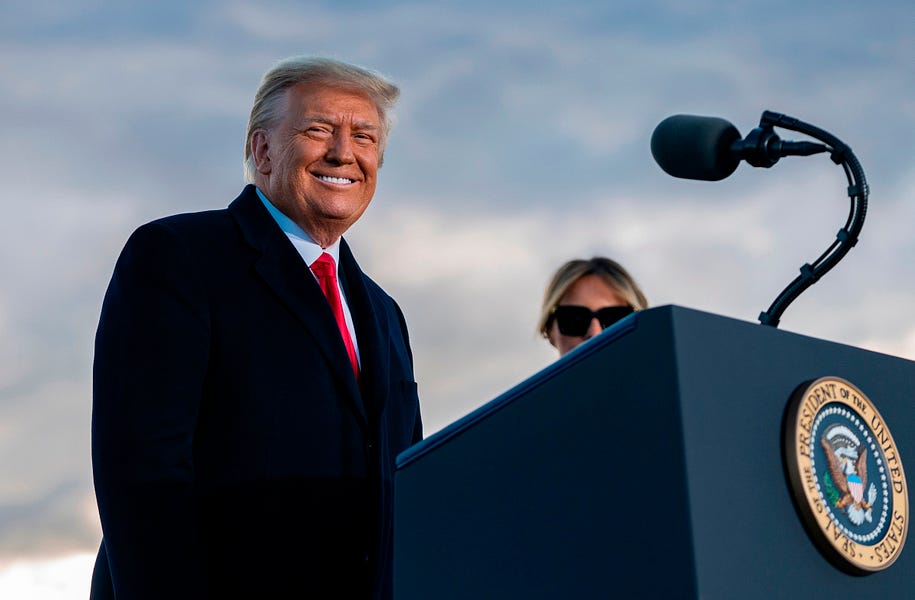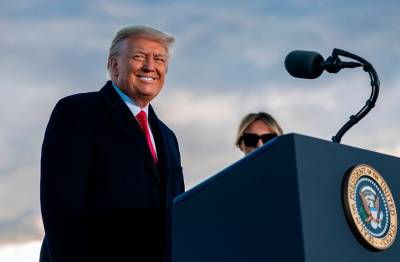Just after Donald Trump took office in 2017, I wrote an essay for The Weekly Standard aiming to calm those worried that the new president was an existential threat to American governing. He might be a bull, I argued, but we should stop acting like our institutions are a china shop.
The Founders understood the dark elements of human nature and created bodies and rules to handle them. Moreover, generations of American public servants have evolved a range of norms and customs, built from their collective experience in the practice of governing, attuned to our worst impulses and most dangerous habits. Our institutions aren’t made of porcelain, I argued. Not only are they robust, they are “antifragile,” capable of getting stronger after being tested.
And tested they were. During his tenure, Trump undercut intelligence officials, invited foreign meddling in his reelection campaign, aimed to undermine the Mueller investigation, and much more. After his loss to Joe Biden in the 2020 election, he continuously lied about the results, lost dozens of court cases, and tried to bully state-level election officials. Near the end of his term, the New York Times reported last week, he considered ousting acting Attorney General Jeffrey A. Rosen in favor of a Justice Department attorney who was willing to advance Trump’s efforts to aggressively challenge Georgia’s election results. And although the nation awaits a full investigation of the appalling events of January 6, 2021, we can say at this point, at minimum, that his behavior was beneath the dignity and duty of his office.
Nearly as disturbing has been the willingness of some of his allies to amplify his lies and provide political cover for his unpresidential behavior. As a result of all of this, there has been serious fretting about insurrection and the precarious state of American liberalism and democracy.
And yet at noon on January 20, Trump was gone and a new administration quietly assumed power. Our institutions held. It is worth reflecting on why.
Two factors stand out. The first is that nearly all of our leaders still think and talk in terms of our established institutions and their roles. During his presidency, when Trump’s behavior was at its most worrisome, the Justice Department followed the law and appointed Mueller as special counsel, executive branch officials considered using the provisions of the Constitution’s 25th Amendment, and Congress activated the Constitution’s impeachment process. When it came time to choose a president, we relied on our established democratic processes; when precinct results were questioned, focus turned to state-level election officials. When the decisions of state-level election officials were challenged, we turned—per legal and constitutional rules—to state and federal courts and state legislatures. When some still questioned the legitimacy of state election results, we turned to the congressional certification process.
Every step of the way, most of our leaders respected and worked through our trusted institutions and processes. Interestingly, even in the instances of the most strenuous, including some of the most misguided, challenges, those objecting typically invoked their legal right to use our institutions to litigate their claims. Trump’s supporters repeated that the president and his campaign were allowed to take their grievances to court. Those who challenged state results in Congress argued that our federal deliberative bodies are precisely where such objections are meant to be debated. Virtually all of our political drama played out on the stage of our established institutions.
When most leaders implicitly trust institutions and then work through them, the decisions of those institutions are generally understood as legitimate. But those institutions become even more trustworthy when their processes and outcomes are scrutinized and deemed to be fair. Said another way, good institutions aren’t merely trustworthy because they are reflexively trusted; they are trustworthy when they behave in ways worthy of trust. And this is what we’ve generally seen over the last four years, especially the last 90 days.
For example, regardless of whether the Mueller Report reached the conclusions any particular person hoped, the investigation was launched by the proper official filling in for an official who had properly recused himself; it was led by a respected law-enforcement official; it produced lawful indictments and convictions; and its findings were made public and debated by Congress. Likewise, 2020 votes were lawfully cast, ballots were tallied and approved by the appropriate local officials, counts were certified by the proper state leaders, courts verified contested results, and Congress certified state outcomes. A reasonable person would recognize these institutional arrangements as fair and their products as valid. So the first piece of good news is that, despite facing enormous pressure, key institutions were relied upon and behaved in reliable ways.
The second piece of good news is that in the moments that mattered most, most key institutional leaders—actual living, breathing individuals—made the right decisions. When a meaningful institutional outcome hinged on a particular person’s choice, in most instances that person acted admirably. The distinction I’m drawing is between those who had to make a dispositive decision in the name of an institution and those who were able to make symbolic gestures that did not commit the institution to a particular course of action. The first reflects the burden of duty; the latter reflects the luxury of posturing.
Presiding over the U.S. Senate during the final certification of votes, Vice President Mike Pence refused to arrogate power his office did not lawfully possess. Acting Attorney General Rosen refused to play along with Trump’s untoward election ploy, and Rosen’s top lieutenants threatened to resign were Rosen fired. State and federal judges, including a number appointed by President Trump, refused to give credence to specious legal claims coming before their courts. State election officials, like Georgia Secretary of State Brad Raffensperger, refused to “find” votes that didn’t exist. State legislative leaders refused to bow to the political pressure to choose alternative electors. These individuals were acting for their institutions, and had any of them picked the opposite course of action, the consequences could have been grave.
In many other high-profile instances, however, officials took advantage of the opportunity to make a statement without making a decision, as it were. Making inflammatory claims about election integrity on a cable-news show, issuing press releases about purported corruption to rile up supporters, signing an amicus brief for a case that is swiftly rejected, or voting “no” on certification when you know the majority will vote “yes” enables a public figure to leverage his or her association with an institution without acting as the institution. This is not to say that such behavior is blameless or costless. It is shameful to knowingly perpetuate a lie, and, as we saw on January 6, perpetuating a lie can have grievous consequences. Indeed, all those associated with an institution should have shared principles of behavior regardless of their roles within the institution. But when assessing our institutions we should differentiate between those acting as and for an institution and those capitalizing on their institutional association.
This difference between dispositive and symbolic action does raise an interesting question with an important implication. Was it simply America’s blind luck that those in dispositive roles happened to be individuals willing to make sound but difficult institutional decisions? Were we just fortunate that the right people were in the right places at the right times? I don’t think it was luck.
I believe that there is something about being in those weighty positions that forces almost all public servants to appreciate the magnitude of their obligations and act accordingly. In other words, imagine that one of those public officials saying the 2020 election was stolen had been magically turned into the vice president, acting attorney general, or Georgia’s secretary of state. Would have he or she then behaved as responsibly in that moment as Pence, Rosen, or Raffensperger? If so, we should take heart—that the gravity of decision-making authority inside of essential public institutions causes individuals to sober up. But it should also bring us pause—that absent that gravity, some individuals will feel liberated to behave less responsibly.
And perhaps this is a general lesson about institutions that we all need to learn: A renewed sense of seriousness about purpose, principles, and duty can result from being seriously tested. If we want an institution to live up to its calling, it and the individuals who populate it must recognize the costs to society of their failing to do so. This should inform our thinking about reforming a range of other essential American institutions that have lost their way and, as a result, lost the public’s confidence.
For example, news outlets that I and others once trusted are now much more interested in advancing political narratives. We simply cannot rely on them anymore; indeed, a recent poll found that 58% of Americans believe “most news organizations are more concerned with supporting an ideology or political position than with informing the public.” Only two in five Americans have a great deal or fair amount of trust in mass media to report the news fully, accurately, and fairly. But America needs journalism to be rigorous and unbiased. America also needs Congress to engage with the nation’s most pressing problems and for higher education to embrace free inquiry and intellectual diversity.
Though much of Donald Trump’s behavior was intolerable, it may have been bracing to the institutions he tested. Hopefully they are reinvigorated, recommitted to their missions, and cognizant of their essential roles in society. Obviously, we shouldn’t wish a Trump-like shock on other institutions. Ideally, they and their leaders will, of their own volition, look around and be sufficiently disquieted by current conditions, recognizing what happens when citizens can’t trust the news, when major policy problems go unaddressed, and when young adults aren’t taught how to live alongside those with dramatically different political views. Hopefully that will be enough of a test for these institutions to rise to the occasion.







Please note that we at The Dispatch hold ourselves, our work, and our commenters to a higher standard than other places on the internet. We welcome comments that foster genuine debate or discussion—including comments critical of us or our work—but responses that include ad hominem attacks on fellow Dispatch members or are intended to stoke fear and anger may be moderated.
With your membership, you only have the ability to comment on The Morning Dispatch articles. Consider upgrading to join the conversation everywhere.